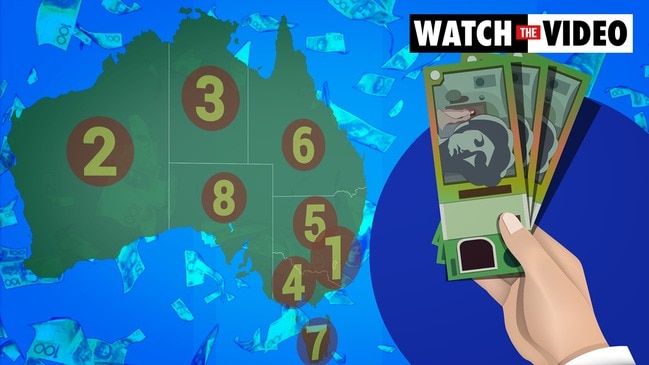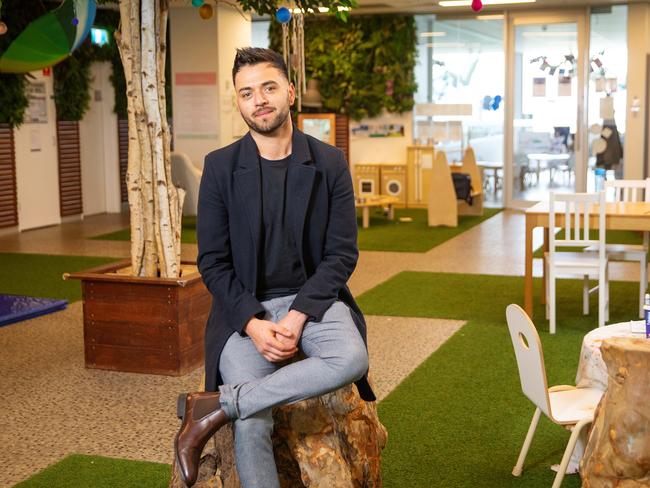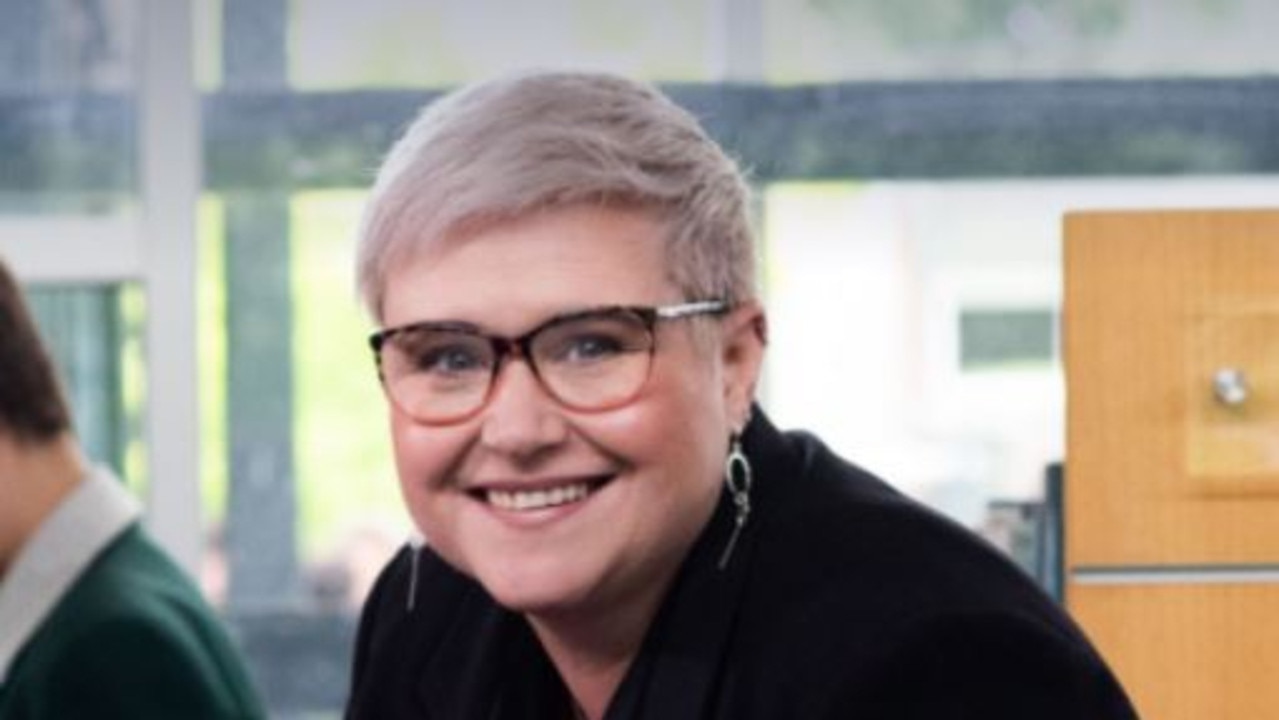Industries with the most jobs available in Victoria and how to get them
It’s now easier to get a job in Victoria despite competition increasing. See what the average salary is and what’s on offer.

News
Don't miss out on the headlines from News. Followed categories will be added to My News.
There are more than 44,700 jobs crying out for workers in Victoria right now, and experts say this is the best time to apply.
Exclusive data from employment marketplace SEEK reveals it is now easier to get a job in 20 out of 28 national sectors than it was before the pandemic.
Between December 2020 and February 2021, the average hospitality and tourism role attracted 50 per cent fewer applicants than a year earlier.
Applicant-to-job ad ratios were also down 43 per cent in trades and services, 39 per cent in manufacturing, transport and logistics, and 34 per cent in sports and recreation.
Competition has heated up, however, in sectors including legal (up 50 per cent), accounting (up 14 per cent) and insurance and superannuation (up 11 per cent).

SEEK employment analyst Leigh Broderick said a number of factors contributed to some industries recording lower applicant ratios, but it was mainly a result of growing job listings as businesses rehired for roles lost during last year’s lockdowns.
The job site’s latest employment report revealed every state and territory was experiencing year-on-year job ad growth for the first time since the pandemic began.
Tasmania’s listings were up 40 per cent in February 2021 compared to February 2020, followed by South Australia (up 37 per cent), The Northern Territory (36 per cent), Western Australia (up 24 per cent), Queensland (up 23 per cent), Victoria (up7 per cent), the ACT (5 per cent), and New South Wales (up 4 per cent).
There are about 44,700 Victoria-based jobs listed on SEEK right now, including 5570 in trades and services, 4960 in healthcare and medical and 4000 in manufacturing, transport and logistics.

Mr Broderick said there were also fewer applications coming from people who already had a job.
“Candidates are a bit more reluctant to jump ship into a new role,” he said.
“They think ‘if I move jobs and something happens, I will be the last person on the boat so the first person out the door’.
“Anecdotally, we hear from a lot of hirers that they are struggling to find good people.
“We are not saying there is no competition but certainly there are opportunities out there – definitely.”
Market research company Roy Morgan chief executive Michele Levine said Australia’s current job market was “as good as it’s going to get for the next little while” as people who had stepped out of the workforce were beginning to want to work again.
“If you are looking for a job, start looking now and start looking hard,” she said.
“In our last release, we saw the number of people employed going up and the number of people unemployed and looking for work also going up.
“This is saying people are now getting up and starting to look for work.”

Roy Morgan reported more than 12.7 million Australians were employed in February – the highest volume since early March, 2020.
Meanwhile, 1.93 million Australians were unemployed, up 250,000 from January.
Ms Levine advised anyone who was currently out of work and wanting a job to “do whatever it takes” to find some form of employment.
“Get a job, get on the ladder, get in there and be valuable to your employer,” she said.
HIRING NOW IN VICTORIA
Jose Vergara Olea joined Guardian Childcare & Education seven years ago as a casual assistant educator.
Now, he is the St Kilda North centre manager and hoping to give others a start in the early childhood industry, with two positions currently available.
“They need a certificate III or a diploma or need to be working towards a qualification,” he said.
“We offer traineeships so they can actually get paid while learning with us.”

Mr Vergara Olea, 30, is looking for people with a great attitude who are passionate about caring for children and supporting their families.
“We offer a great curriculum at the centre,” he said.
“We want people to come and see that, and grow in the company.
“It’s a great career for people to come back to work (if they lose their job when JobKeeper ends) and it’s a great career path.
“You can start as an assistant educator and move to management quite quickly if you have the right passion.”
The Hillside resident said Guardian also supported workers who wished to relocate to other parts of Australia, as the organisation had roles available nationally.
Guardian chief people and culture officer Louisa Rinaldi said they had more than 40 centres in Victoria alone, with positions for trainees, certificate and diploma-qualified educators, university accredited teachers, managers, administrators, chefs and cooks.
“We have got quite a large spectrum of different roles,” she said.
“It’s a well-known fact that early learning and childcare has a skill shortage – it always has been the case.
“We want people who are naturally positive and really find joy in what they do.”
RESUME TIPS
1 Go for substance over style
Flashy formatting and in-your-face design can detract.
Go for simplicity and ease of reading, and avoid jargonistic language.
What matters the most is the substance of what you are saying about yourself.
2 Articulate your value
At the beginning of your CV, have a summary statement outlining your core capabilities, skills and the value you deliver.
Think of this as your “unique selling proposition”.
This is your opportunity to sell yourself and why they should hire you.
3 Little things matter
Your CV won’t get past the first hurdle if you have spelling and grammatical mistakes.
Get a trusted (and skilled) friend or colleague to proof read your CV.
4 Be targeted and tailored
Customise your CV for each job you apply for.
Be specific and emphasise what you have delivered and the results you have achieved in your roles, rather than just listing role responsibilities.
For example, writing “managed sales activities” is far less effective than saying “delivered increased sales by 15 per cent each quarter for the last 12 months”.
5 Leverage LinkedIn
Most recruiters will validate your CV by looking at your LinkedIn profile.
Add to your credibility with endorsements and, more importantly, recommendations and any awards or special achievements.
SOURCE: Workplace expert and author of Career Leap: How to Reinvent and Liberate your Career Michelle Gibbings
BEFORE A JOB INTERVIEW
1 DO YOUR RESEARCH
On the industry – recent developments, trends, changes
On the company – its history, products/services, values, purpose, customers, culture
On the hiring manager – who they are, their role, expertise, past experience
On the role – what it involves, previous work the team has completed
2 PRACTICE HOW YOU WILL INTRODUCE YOURSELF
Explain your education and professional background
For example, “I am a business management graduate with a master’s in digital marketing. Since leaving university, I have enjoyed a two-year marketing career within the sports industry.”
Discuss relevant skills and expertise
For example, “During this time, I have been able to apply what I learnt during my master’s, while building upon my digital marketing expertise even further. I believe that my digital marketing skills are best showcased by an email marketing campaign I recently led, which increased our conversion rate by 10 per cent.”
Describe what you are looking for
For example, “My previous organisation has helped me develop the digital skills I have today, however, I believe that for the sake of progressing my expertise further, it’s time to move on. I’m looking for a more challenging role within a fast-paced global organisation, where there is plenty of room for me to grow as a marketing professional; hence I was so pleased to be invited to interview for this role.”
3 PREPARE ANSWERS FOR COMMON QUESTIONS
“Why are you looking to leave your current job?”
DON’T focus on what you dislike about your current role or organisation.
DO focus on the opportunities you see in the position you have applied for.
“Why should I hire you?”
DO think about what benefits you will bring to the company if they take you on, rather than someone else.
DO identify three skills or experiences, including technical skills mentioned in the job description and ‘soft skills’ such as communication and the ability to work in a team.
DON’T disengage the interviewer with an overly long and poorly structured response.
“Tell me about a time you failed?
DO choose a genuine example of where you made an oversight or error in judgment.
DO show you have learnt from the situation.
DON’T make excuses or blame others.
4 PLAN QUESTIONS TO ASK THE INTERVIEWER
Good examples include:
Is this a new role? If not, how has it evolved?
Is there scope for career progression?
What does success look like in this job?
How does the team fit into the overall structure of the company?
What constitutes success for the team?
From your perspective, what’s it like to work here?
What is your management style?
What training opportunities are available?
What are the main challenges and opportunities the business faces?
How does your organisation live its purpose?
SOURCE: Hays Interview Guide
Originally published as Industries with the most jobs available in Victoria and how to get them


